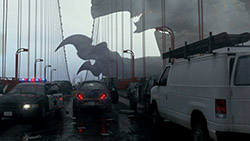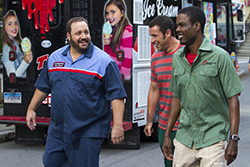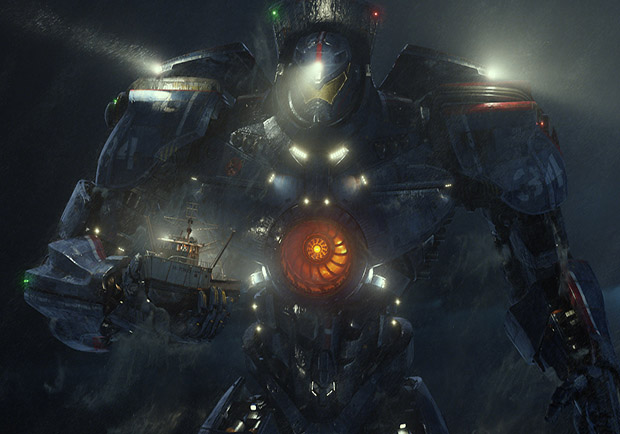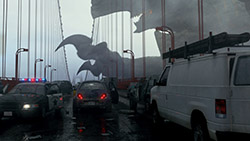Comparing Grown Ups 2 to Pacific Rim reminds one of the old David Sedaris joke about a stewardess who asked an airplane passenger which he preferred for his meal: the chicken, or a sandwich made with excrement and shards of broken glass. After a lengthy pause, the passenger inquires, "How was the chicken cooked?"
Sedaris made his joke during an election season to describe his bewilderment at voters who claimed, with less than a month to go before an election, that they were still undecided. I am similarly at a loss to imagine the potential moviegoer who is waking up on Friday morning and trying to decide what movie to see this weekend: "Grown Ups 2 or Pacific Rim? I just can't decide. Let's see what Christianity Today has to say . . . "

Pacific Rim is the chicken here. While I can't quite convince myself that it is the equivalent of a four-star meal that some of its geeking fan boys want it so desperately to be, I concede that it is, at the very least, edible. And in a summer of downed presidential residences, singular rangers, and multiple hangovers, the merely competent grows in our esteem, if not our imagination.
A cross between Real Steel and Godzilla, Pacific Rim follows the military-action formula from the start. It uses an opening battle scene to explain (I use the word loosely) the conflict and outline the basic weapons and strategies used by its participants. Earth is being attacked by giant monsters coming through a dimensional portal ("the breach") in the Pacific Ocean. They are fought back by a group of rangers in "Jaegers," metallic, humanoid-shaped armored vehicles so large they can only be controlled by two pilots whose minds are melded. An early failure makes a maverick pilot doubt himself, setting up a redemption-through-combat story (a la Top Gun), and in between fights there are a few interpersonal conflicts that must be negotiated lest ego and human emotion get in the way of saving the world.
There is an oppressive, relentless big-ness to the film, which is why those who like it may find their enthusiasm meters stuck on "Awesome!" But I'm hard pressed to think that the average moviegoer over twenty-one won't have a migraine by the end of the first hour and feel hung over by the end of the second.
But it's not just the volume, though. Rarely have I loathed a film's score as much as this one. The stirring, buoyant music sets exactly the wrong tone for the scale of destruction being perpetrated. In one flashback we see how traumatized a little girl is supposed to be by witnessing the destruction of a city, yet at no point is there room for us to stop ogling the spectacular choreographed beauty of the carnage long enough to wrap our heads around what we are told are the stakes of these battles.
I've spoken elsewhere about the tendency to escalate the stakes in action movies and the way it backfires. We know the world is not going to end, and so once the stakes get high enough, there is no real tension, even when the umpteenth digital clock is counting down and must be beaten by a scrambling human who is dodging debris to push a button.

There is also a strange sort of disconnect in the film's statement of theme(s). Historically the Godzilla films have been environmental or nuclear allegories, warning about science and technology outstripping human-kind's ability to wield them responsibly. But here, when the oddly named Stacker Pentecost (Idris Elba) gives his rally-the-troops speech, it is a celebration of human achievement. Humans have chosen to "believe in" themselves and so are going to "cancel the apocalypse." An early voice-over narration tells of how men used to have to run from a tornado, but no longer. Given that those elements of nature that we cannot control have historically been dubbed "acts of God," this early speech, while subtle, contributes to an understated but persistent god-is-dead-we're-alone-but-that's-okay-because-the-evolutionary-drive-to-survive-is-the-strongest-force-in-the-universe subtext that renders humanity's eventual triumph surprisingly listless. (The only mention of God comes when a scientist says that numbers are the closest thing we get to God's handwriting.)
And yet, paradoxically, the survival of humanity carries no emotional weight; only individual relationships and personal losses provide any sort of emotional punch. Throw in some oddly timed jokes (one involving perpetual motion balls was mind-boggling in its stupidity and yet garnered cackles of glee among the preview audience) and you end up with a film that is tailor-made to be watched in trailer-sized chunks, but strains our patience as it frays our nerves.
Grown Ups 2? Truthfully, it is not the worst movie ever, nor even really the worst movie I've seen this year. But that says more about the depressingly low state of our expectations than it does about Adam Sandler's script and Dennis Dugan's direction. The original Grown Ups reportedly grossed $160 million, and as hard pressed as I am to believe those numbers (or see God's handwriting in them), I can report that most of the audience where I screened the sequel roared in delight as a minor character expressed his loathing for the woman he married, throwing a metal tool at her and hitting her square in the back of the head. It's easy enough to point the finger at Hollywood for making trash, but a part of me thinks that maybe we get the movies we deserve.

The first "joke" in Grown Ups 2 is a sight gag involving a deer peeing into Adam Sandler's mouth. The film's final scene (though not quite the final joke) involves the same deer biting at a minor character's genitals. Clearly this is the film to see if you have a long standing grievance about the way deer have been mistreated by humans and long to see them take their revenge.
While the original Grown Ups had a bare-bones plot about youth basketball friends reuniting after the death of their coach, the sequel gives up any pretense of storytelling and simply stitches sketches together like a Best of the Worst Saturday Night Live compendium. There are gags (I can't even call them jokes) about a man having a bowel movement in a display toilet at K-Mart, an ice-cream vendor being fooled into fixing a dispenser so that it looks like the chocolate soft-serve is being expelled from his pants, a fake aerobics instructor fooling the female exercisers into warming up by spanking their own butts, and a wife showing her husband how much she trusts him by taking him to a car wash to ogle underdressed girls.
The sexual politics of Grown Ups 2 is one of the most baffling and bizarre aspects of a film that might otherwise just be marginally offensive in apathetic spurts. The characters with daughters (Sandler and Rock) are supposed to be redeemed by their fatherly concerns for female innocence while simultaneously speaking of their wives with cynicism and treating them with contempt. (Sandler, for example, gives the mail carrier a high-five when the postman complements him on the size of his wife's breasts.) On the one hand, the daughter of Rock's character is so fresh and innocent that she cannot even sing in front of other people. On the other, the girl whom Sandler's teenaged son has a crush on shows up for an 80s party in a skin-tight Pat Benatar-style striped leotard that would make a Sports Illustrated swimsuit model blush. Apparently our daughters are supposed to be good girls and all other females are meant to be sexually aggressive and available—the younger the better.
Amidst long sections that are just painful to watch, there are a few laughs. Oddly enough, most are delivered by the supporting cast. A police officer played by Shaquille O'Neal wrecks a squad car in a way you've probably not seen before. A young heartthrob best known for the Twilight movies makes an uncredited cameo as an insane fraternity leader and steals every scene he is in, demonstrating more comedic flair than Sandler, Rock, Spade, and James put together. The funniest exchange of the film by far comes when Sandler's character asks the town's gay aerobics instructor how he managed to sew his daughter's beloved stuffed animal back together. I'd share it, but when a sandwich only has one bite without shards of broken glass in it, the compassionate thing to do is let those who insist they are going to eat the whole thing at least have one sliver to look forward to.
The Family Corner
Pacific Rim is rated PG-13 for science-fiction violence. The majority comes in the form of property destruction, of which there is a lot. One character is suddenly and unexpectedly eaten by a monster in a scene reminiscent of Jurassic Park. There is at least one expletive and one use (mid-credits) of God's name used as a profanity.
Grown Ups 2 comes in with a PG-13 rating, illustrating yet again Hollywood's advanced science of knowing how to push the envelope while avoiding the key elements (breasts and the "F" word) that would mandate an "R." Ratings appear to no longer reflect the degree or amount of objectionable content so much as track a specific subset of it. So even though the film is PG-13, we get brief glimpses of male nudity as the stars have to dive into a swimming hole, multiple instances of projectile vomiting and physical assault played for humor. (In one instance a grown man breaks the leg of a child.) There is no sex, though there are lots of jokes about sex. There is a steady stream of crass language, mostly crude euphemisms for the buttocks or male genitals.












